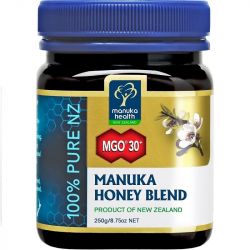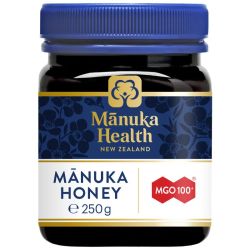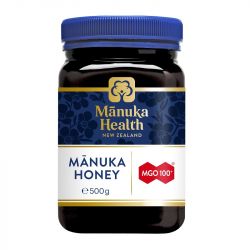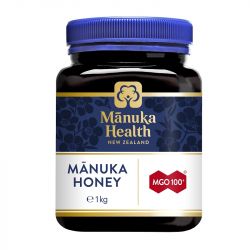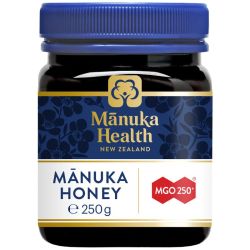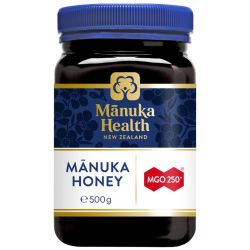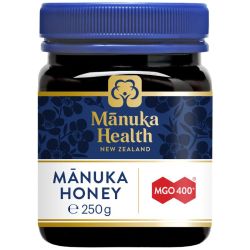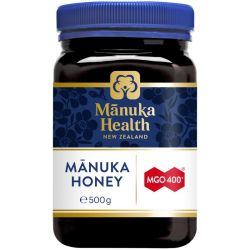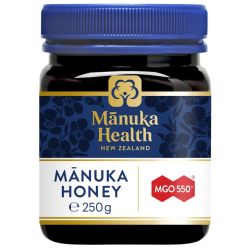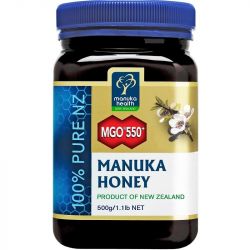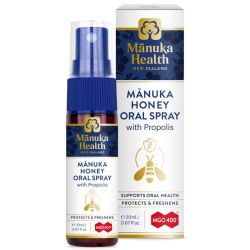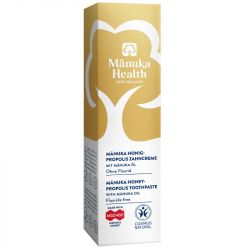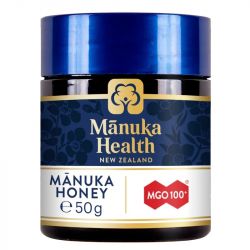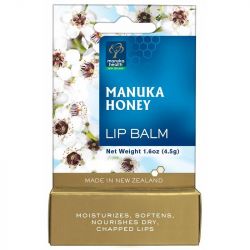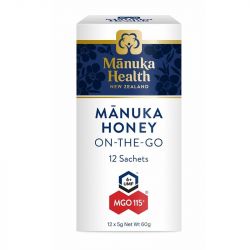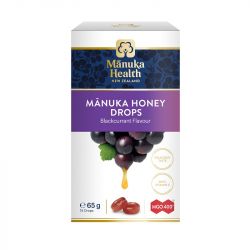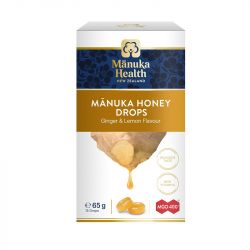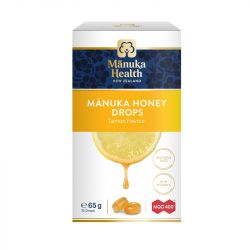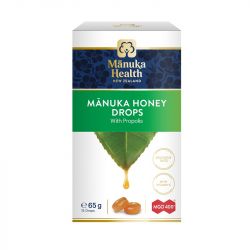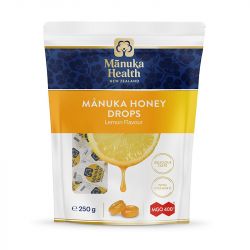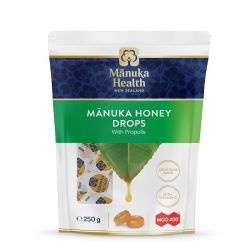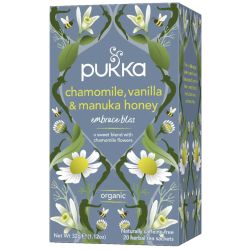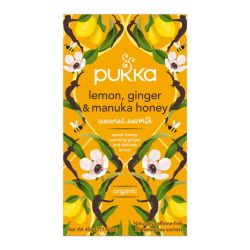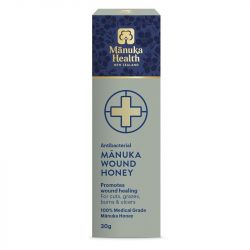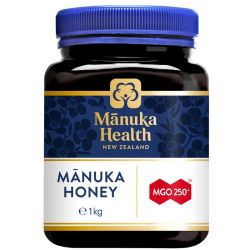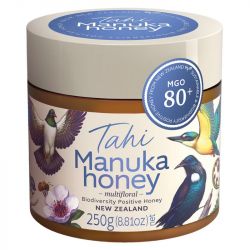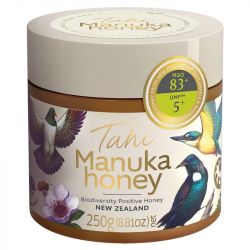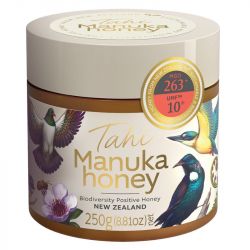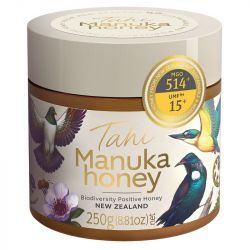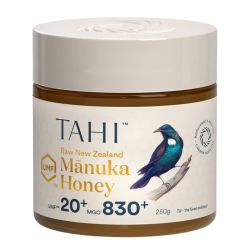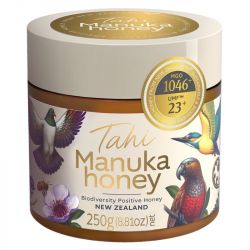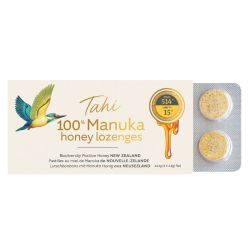Manuka Honey
Manuka honey is a premium, natural sweetener known for its rich flavour and unique wellness properties, making it a popular choice for those looking to support immunity, soothe digestion or enjoy a healthier lifestyle. Sourced from the nectar of the manuka bush in New Zealand, this honey is prized for its naturally occurring methylglyoxal (MGO), which gives it its renowned antibacterial strength.
We offer a curated selection of high-quality manuka honeys, including certified UMF and MGO-rated options to suit your needs. Choose from jars of varying strengths and purities, each independently tested for authenticity and quality.
- Manuka Health Propolis & MGO 400 Manuka Honey Oral Spray 20mlSpecial Price £12.99 Regular Price £15.99
- Manuka Health MGO400+ Manuka Honey & Propolis Toothpaste 100gSpecial Price £5.59 Regular Price £6.99
- Manuka Health MGO 400+ Manuka Honey Drops with Blackcurrant 65gSpecial Price £6.79 Regular Price £7.99
- Manuka Health MGO 400+ Manuka Honey Drops with Ginger & Lemon 65gSpecial Price £6.79 Regular Price £7.99
- Manuka Health MGO 400+ Manuka Honey Drops with Propolis 250gSpecial Price £17.99 Regular Price £21.99
- Tahi New Zealand 100% Manuka Honey UMF15+/MGO514+ Lozenges 8Special Price £12.59 Regular Price £13.99
All you need to know about Manuka Honey
What are the benefits of taking Manuka Honey?
Manuka honey is prized for its unique antibacterial, anti-inflammatory, and soothing properties, thanks to its high levels of methylglyoxal (MGO). Here are some of the main benefits:
- Supports immune health
Manuka honey’s antibacterial action can help the body fight off common infections and support natural immunity
- Soothes sore throats and coughs
Its thick, soothing texture coats the throat, while MGO helps reduce inflammation and fight bacteria
- Aids digestion
Manuka honey may help balance gut bacteria and soothe digestive discomfort, including bloating and acid reflux
- Promotes wound healing
Used topically, Manuka honey can support healing of cuts, burns and ulcers due to its antimicrobial and anti-inflammatory effects
- Skin care benefits
Its antibacterial and hydrating properties make it useful for acne-prone or dry skin when applied in masks or skincare products
Many people use Manuka honey as a daily wellness boost or as a natural remedy during colds, digestive flare-ups, or minor skin irritations.
Can you take Manuka Honey everyday?
Yes, Manuka honey can be taken daily and is generally safe for most people when consumed in moderation – typically 1 to 2 teaspoons per day is enough to enjoy its natural benefits.
Here are a few things to keep in mind:
- It's still a sugar: While it has unique antibacterial compounds like MGO, it’s still high in natural sugars, so it’s best not to overdo it
- Choose a quality grade: Look for MGO 100+ or UMF 10+ for daily use, unless advised otherwise by a healthcare professional
- Medical conditions: People with diabetes, bee allergies, or those on certain medications should check with a doctor first
Can you give Manuka Honey to children?
You should never give Manuka Honey to infants under 1 year old. There is a risk of botulism when giving honey to young children.
Children over 1 can be given honey but typically we always advise to give very small amounts and then to gradually increase it over time.
What is the best way to take Manuka Honey?
Straight off a spoon! Manuka Honey is an active, when you add it to hot drinks you often kill the activity so it is still sweet but you don’t necessarily get as many health benefits from it.
You can also mix honey into yoghurts or other cold foods and it should get into your system and remain active.
What is the difference between MGO and UMF?
MGO and UMF are both grading systems used to indicate the potency and quality of Manuka honey, but they measure different things:
MGO (Methylglyoxal):
- What it measures: The direct level of methylglyoxal in the honey, which is the compound responsible for Manuka's antibacterial properties
- Example: MGO 100+ means the honey contains at least 100mg of methylglyoxal per kilogram
- Straightforward and scientific: Useful if you want to know exactly how much of the active compound is present
UMF (Unique Manuka Factor):
- What it measures: A broader grading system that includes MGO, DHA (dihydroxyacetone), and leptosperin
- Gives a fuller picture: Reflects the honey’s authenticity, quality, and antibacterial strength
- Example: UMF 10+ is roughly equivalent to MGO 263+
- Only licensed producers can use it: Ensures stricter quality standards and testing
Is it true there is a lot of fake Manuka Honey? How can I be sure what I am buying is genuine?
Yes, it’s true — fake or mislabelled Manuka honey is a real issue, as global demand far exceeds the actual supply produced in New Zealand. To avoid buying an inauthentic product, here’s how you can make sure your Manuka honey is genuine:
- Look for UMF or MGO certification
- UMF (Unique Manuka Factor): A trademarked quality mark used only by licensed New Zealand producers. It guarantees the honey meets strict standards for MGO, DHA, and leptosperin levels
- MGO rating: Should be clearly stated (e.g. MGO 263+) and ideally backed by independent lab testing
- Check for a New Zealand origin
Genuine Manuka honey must come from Leptospermum scoparium, a plant native to New Zealand. Look for "Product of New Zealand" on the label, not just “packed in” or “blended in”
- Verify the brand
Buy from reputable brands that offer transparency about their sourcing, testing, and certifications. Trusted brands usually list batch numbers, lab test results, or traceability info
- Price check
Manuka honey is expensive to produce — if the price seems too good to be true, it probably is.

